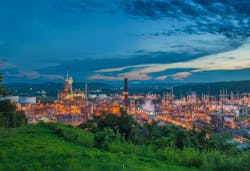Marathon Petroleum cancels Anacortes refinery petrochemicals project
Marathon Petroleum Corp. (MPC) has cancelled plans to move forward with a petrochemical feedstock project proposed by former Tesoro Corp. to enhance xylene recovery at the 119,000-b/d Anacortes, Wash., refinery about 70 miles north of Seattle (OGJ Online, July 21, 2014).
In deal finalized on Dec. 30, MPC agreed to withdraw plans to manufacture and export 15,000 b/d of mixed xylenes—petrochemicals used to make plastics—through the Salish Sea in exchange for six environmental organizations to drop an ongoing appeal of related permits for the refinery project in Skagit County, Wash., said Friends of the San Juans, one of the environmental groups involved in the appeal.
The proposal to produce and export mixed xylenes would have caused a dramatic increase in energy use required for the refinery and would have required the transport of large quantities of feedstocks, as well as shipping tankers of the refined product, to the Asia-Pacific region, resulting in a climate impact equivalent to adding 75,000 vehicles to the road, according to Friends of the San Juans.
The environmental groups argued that Skagit County’s environmental impact statement did not adequately analyze the risk of the additional vessel trips, exacerbated risk of an oil and chemical spill, and increased threats to the endangered Southern Resident Killer Whale population.
As part of the deal, the six environmental organizations have agreed not to oppose MPC subsidiary Tesoro Refining and Marketing Co LLC in constructing its marine-vapor emission control system (MVEC). The MVEC system will capture and burn fugitive vapors that could otherwise be released and cause pollution during loading and unloading of petrochemicals at MPC’s pier.
While the MVEC system was necessary to manage increased emissions that would have occurred from the xylene export proposal, the system can also be used to limit the impact of existing operations, according to the environmental group.
Friends of the San Juans said the consortium of environmental organizations did not oppose other project components related to reducing the sulfur content of diesel, and those clean-fuels project components have now been completed.
Alongside Friends of the San Juans, the appeal of project permits also included environmental groups Stand.earth, RE Sources for Sustainable Communities, Friends of the Earth, Puget Soundkeeper, and Evergreen Islands.
As originally planned, Tesoro’s Anacortes project included a $90 million naphtha isomerization project as well as the $300 million mixed xylenes project.
Designed to comply with upcoming reduced-sulfur gasoline regulations, the naphtha isomerization project, which was scheduled for start-up in 2018 pending permitting, also intended to reduce gasoline production costs (OGJ Online, Feb. 15, 2015).
MPC completed its acquisition of Andeavor (formerly Tesoro) in late 2018 (OGJ Online, Oct. 1, 2018).
About the Author
Robert Brelsford
Downstream Editor
Robert Brelsford joined Oil & Gas Journal in October 2013 as downstream technology editor after 8 years as a crude oil price and news reporter on spot crude transactions at the US Gulf Coast, West Coast, Canadian, and Latin American markets. He holds a BA (2000) in English from Rice University and an MS (2003) in education and social policy from Northwestern University.

